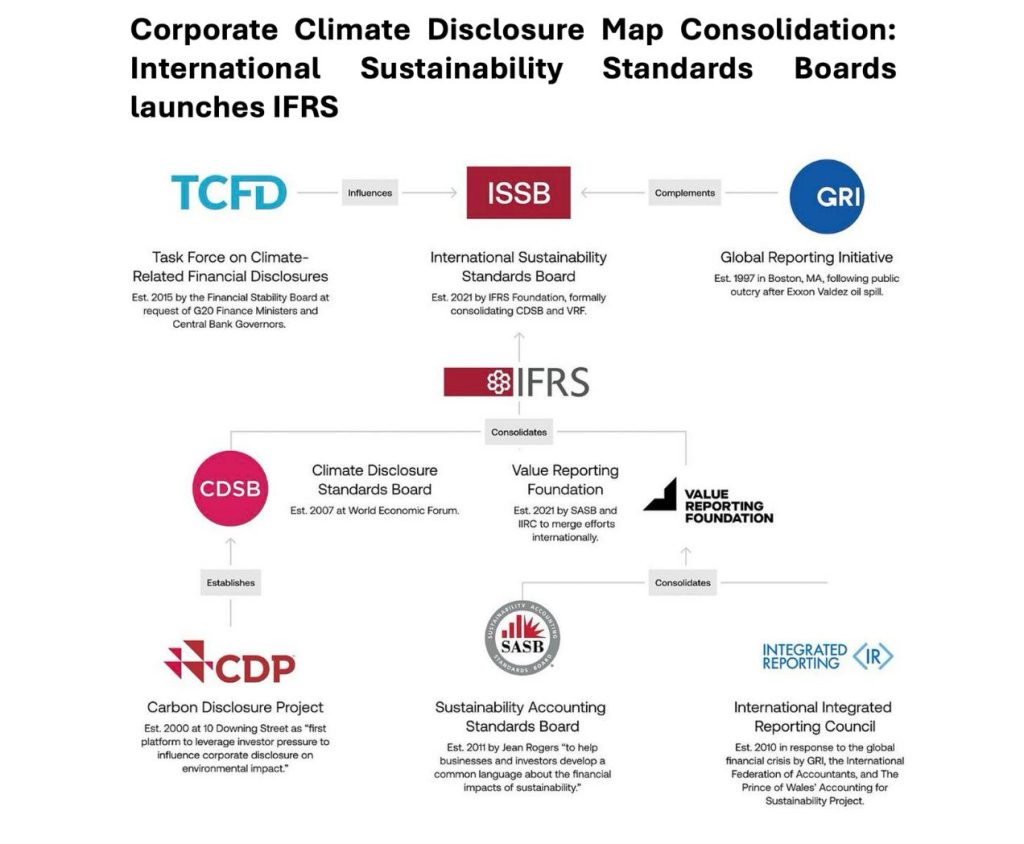The International Sustainability Standards Board (ISSB) issued its first two standards IFRS S1 and IFRS S2 on June 26, 2023 setting the beginning of a new era in Sustainability-Related Disclosures.
The global approach of these standards is endorsed by the G20 and other stakeholders, which will provide investors with globally comparable Sustainability-Related Disclosures that have may have the potential to move market prices, without limiting jurisdictions that require additional disclosures.
IFRS S1 : “General Requirements for Sustainability-Related Financial Disclosure“, aims to ensure that an entity discloses information about its Sustainability-Related Risks and Opportunities that can be expected to affect its cash flows, access to financing, or cost of capital in the short, medium, or long term. This will provide information for decision-making by users of financial reports regarding resource provision.
IFRS S1 stipulates that the reporting entity will disclose the following at a general level:
- Governance: Processes, controls, and governance procedures that the entity uses to oversee and manage sustainability-related risks and opportunities.
- Strategy: The approach that the entity adopts to manage sustainability-related risks and opportunities.
- Risk Management: The processes that the entity adopts to identify, assess, prioritize, and monitor sustainability-related risks and opportunities.
- Metrics and Objectives: The entity’s performance in relation to sustainability-related risks and opportunities, including progress towards any objectives set by the entity or required to be met by law or regulations.
On the other hand, IFRS S2 requires a company to disclose information about its Climate-Related Risks and Opportunities that could reasonably be expected to affect the entity’s cash flows, access to financing, or cost of capital in the short, medium, or long term. The goal is to provide financial report users with the necessary tools to decide on resource provision.
- Governance: Processes, controls, and procedures to monitor and manage climate related risks
- Strategy: Described approach for addressing climate-related risks and opportunities that could affect business model and strategy over the short, medium, and long term.
- Risk Management: Identify, assess, and manage climate related risks.
- Metrics and Objectives: Industry based metrics measuring the progress toward targets with cross industry metrics.
These international standards came into effect for annual periods beginning on January 1, 2024. Early adoption was allowed provided that both standards were applied. The first reports aligned with these standards will be those for 2024, published in 2025.
In the following infographic, you can find a very short summary of how the ‘’Alphabet Soup of Sustainability is being harmonized by the ISSB in order to consolidate relevant information for all the stakeholders.

In order to comply with the standards, ALLCOT can support your organization across different jurisdictions in:
Sustainability Strategy Development:
- Assessing current sustainability practices and goals.
- Developing tailored sustainability strategies aligned with the company’s objectives and industry best practices.
- Identifying opportunities for innovation and improvement in sustainability initiatives.
Climate Risk Assessment:
- Conducting comprehensive assessments to identify and evaluate Climate-Related Risks and opportunities facing the business.
- Analyzing the potential impacts of climate change on operations, supply chains, and financial performance.
- Developing strategies to mitigate climate risks and capitalize on opportunities for resilience and adaptation.
Climate Resilience Planning:
- Developing Climate Resilience plans to address the Physical, Transitional and Operational risks posed by Climate Change.
- Identifying vulnerable assets, infrastructure, and communities and implementing measures to enhance resilience.
- Providing training and capacity-building initiatives to empower employees and stakeholders to respond effectively to climate-related challenges.
Carbon Footprint Measurement and Reduction:
- Calculating the company’s carbon footprint across scopes 1, 2, and 3 emissions.
- Identifying key sources of emissions and areas for emission reduction.
- Implementing carbon reduction strategies, including energy efficiency measures, renewable energy adoption, and carbon offsetting initiatives.
Sustainable Supply Chain Management:
- Assessing supply chain sustainability risks and opportunities.
- Developing sustainable sourcing strategies and supplier engagement programs.
- Implementing supply chain transparency and traceability measures to ensure responsible sourcing practices.
ESG (Environmental, Social, and Governance) Integration:
- Integrating ESG considerations into investment decision-making processes.
- Conducting ESG due diligence for investment portfolios and corporate transactions.
- Developing ESG reporting frameworks and disclosure strategies to enhance transparency and accountability.
Sustainable Finance Advisory:
- Advising clients on sustainable finance opportunities, including green bonds, sustainability-linked loans, and impact investing.
- Assisting with the development and implementation of sustainable finance strategies and products.
- Supporting clients in aligning their financial activities with sustainability goals and regulatory requirements.
Stakeholder Engagement and Communication:
- Developing stakeholder engagement strategies to foster dialogue and collaboration on sustainability initiatives.
- Designing communication plans to transparently report on sustainability performance and progress.
- Engaging with investors, customers, employees, and communities to build trust and support for sustainability efforts.
Regulatory Compliance and Reporting:
- Providing guidance on regulatory requirements related to sustainability, climate risk, and ESG disclosure.
- Assisting with the development of sustainability reports, annual filings, and other regulatory disclosures.
- Conducting gap analyzes to ensure compliance with emerging sustainability standards and regulations.
Training and Capacity Building:
- Offering training programs and workshops on sustainability best practices, climate risk management, and ESG integration.
- Building internal capacity through skills development and knowledge transfer initiatives.
- Empowering employees to become sustainability champions and drive positive change within their organizations.
These standards enhance transparency and accountability regarding environmental and social practices while aligning corporate strategies with global sustainability objectives.
As businesses prepare for the adoption of these standards, careful planning, rigorous data management, and strategic alignment are essential for the journey ahead.
Here’s where ALLCOT range of solutions comes in, assisting you and your company in efficiently managing and reporting data in compliance with IFRS S1 and IFRS S2 disclosures.
Do not hesitate to contact us if you would like to find out more about our services.





